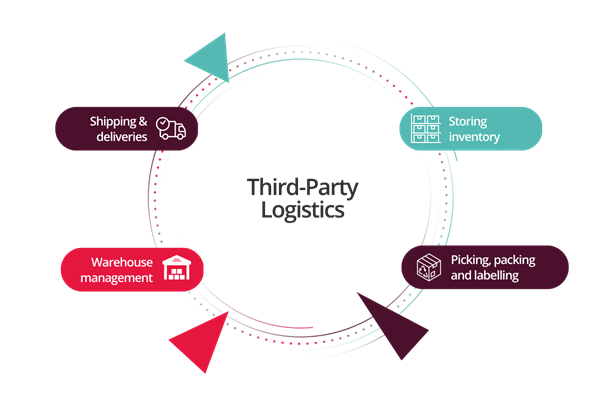What Is The Role Of Third-Party Logistics (3pl) Providers?

In the complex world of supply chain management, businesses often face the challenge of optimising their logistics operations while focusing on their core competencies. This is where third-party logistics (3PL) providers step in to offer their expertise and resources. With logistics services evolving rapidly to meet the demands of global commerce, understanding the pivotal role of 3PL providers becomes essential for businesses aiming to streamline their operations and enhance their competitive edge.
Introduction to Third-Party Logistics (3PL) Providers
At its core, third-party logistics refers to the outsourcing of logistics functions to specialised external service providers. These entities offer a wide array of services spanning transportation, warehousing, inventory management, order fulfilment, and more. By leveraging the capabilities of 3PL providers, businesses can focus on their core activities while entrusting the intricacies of logistics and distribution to experts in the field.
Enhancing Efficiency and Flexibility
One of the primary roles of 3PL providers is to enhance the efficiency and flexibility of supply chain operations. Through their expertise and infrastructure, these providers can optimise transportation routes, streamline warehousing processes, and implement advanced inventory management techniques. By doing so, businesses can reduce costs, minimise lead times, and respond swiftly to fluctuations in demand. Whether it’s a startup aiming to scale rapidly or an established enterprise seeking to adapt to market dynamics, 3PL providers offer tailored solutions to meet diverse needs.
Cost Optimization and Scalability
Logistics services can represent a significant portion of a company’s expenses, especially for those operating on a global scale. By partnering with 3PL providers, businesses can achieve cost optimization through economies of scale and operational efficiencies. Instead of investing in infrastructure and personnel, companies can access the resources of 3PL providers on a scalable basis, paying only for the services they require. This not only reduces fixed costs but also allows for greater flexibility in adapting to fluctuating demand patterns, seasonal variations, or sudden market shifts.
Specialised Expertise and Technology Integration
In today’s digitally-driven landscape, technology plays a pivotal role in optimising logistics and distribution processes. 3PL providers often invest heavily in state-of-the-art technologies such as warehouse management systems (WMS), transportation management systems (TMS), and predictive analytics tools. By harnessing these technologies, businesses can gain real-time visibility into their supply chain, improve inventory accuracy, and enhance decision-making capabilities. Moreover, 3PL providers bring specialised expertise in navigating regulatory compliance, managing customs procedures, and mitigating risks associated with international logistics.
Focus on Core Competencies
Outsourcing logistics functions to 3PL providers allows businesses to focus on their core competencies without being bogged down by the complexities of supply chain management. Whether it’s product development, marketing, or customer service, companies can direct their resources and attention towards areas where they can add the most value. Meanwhile, 3PL providers take on the responsibility of ensuring seamless logistics operations, thereby freeing up valuable time and resources for strategic initiatives.
Scalable Solutions for Diverse Industries
The role of 3PL providers extends across various industries, catering to the unique needs and challenges of each sector. From e-commerce and retail to manufacturing and healthcare, these providers offer scalable solutions tailored to specific industry requirements. For instance, in the e-commerce sector, where speed and reliability are paramount, 3PL providers play a crucial role in enabling same-day or next-day delivery options. In contrast, in the healthcare industry, stringent regulations and temperature-sensitive products necessitate specialised logistics solutions, which 3PL providers are adept at providing.
Also Read: A Comprehensive Guide to Mobile Wallets
Customer Satisfaction and Competitive Advantage
In today’s hyper-competitive business landscape, customer satisfaction is a key differentiator that can make or break a company’s success. By partnering with 3PL providers, businesses can enhance the overall customer experience through faster delivery times, accurate order fulfilment, and seamless logistics operations. Whether it’s ensuring on-time delivery of products or implementing efficient returns management processes, 3PL providers contribute to building customer loyalty and driving repeat business. In this way, they not only support the operational objectives of businesses but also contribute to their long-term sustainability and competitive advantage.
Conclusion
In conclusion, third-party logistics (3PL) providers play a multifaceted role in today’s globalised economy, offering a range of services to streamline logistics and distribution processes. From cost optimization and scalability to specialised expertise and technology integration, these providers enable businesses to enhance efficiency, flexibility, and customer satisfaction. By outsourcing logistics functions to 3PL providers, businesses can focus on their core competencies while benefiting from the expertise and resources of specialised service providers. In essence, 3PL providers serve as strategic partners, empowering businesses to navigate the complexities of supply chain management and achieve sustainable growth in an increasingly competitive marketplace.



